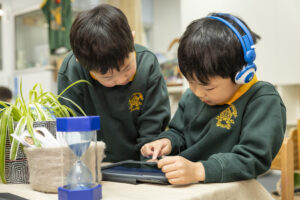Curriculum
Contemporary learning frameworks and diverse subject options.
- Home
- |
- Learning
- |
- Our approach
- |
- Curriculum
For over 120 years, teaching and learning has been at the core of what we do at Trinity Grammar School, Kew.
Predicated by the Australian Curriculum and underscored by a philosophy of student agency, growth and resilience, our approach offers young people the breadth and depth to become their best selves.
The Trinity classroom is a defined single-sex learning environment for boys from Prep-Year 10, with the opportunity to experience coeducation in VCE in partnership with Ruyton Girls’ School. Our Early Learning Centre accommodates both boys and girls at the 3 and 4-year-old level.
At every age and stage, personalised learning is a priority. Our teaching staff work in partnership with students, parents, support staff and leadership to walk with them on their educational journey.
Senior School
Boys, Year 7 – Year 12
The Trinity Grammar School Senior School teaches the Victorian Curriculum, with a broad range of general and specialist subject offerings that empower students to pave their own path.
Years 7 and 8
The Years 7 and 8 curriculum is designed as a two-year sequence with students studying eight subjects per term, introducing them to the full breadth of study areas.
Year 9
In Year 9, students begin to target their learning through the elective program.
The core curriculum is expanded through a suite of semester-length subjects designed to encourage students to discover and hone in on their interests.
Year 10
Year 10 sees students begin to shape their pathway into their final years of school, exploring the VCE subject areas they plan to study in Years 11 and 12.
Years 11 and 12 (VCE)
Students in Years 11 and 12 pursue their chosen subject streams with the support of specialist staff, resources and facilities.
Some VCE subjects are taught in a co-educational setting in partnership with Ruyton Girls’ School, further extending learning environments and opportunities for students.
To attain the Victorian Certificate of Education (VCE), students must successfully complete at least 16 units, including:
- Three units from the English group, including a Unit 3 and 4 sequence
- At least three other sequences of Unit 3 and 4 studies
Over Years 11 and 12, most students study between 20 and 24 units, usually six studies in Year 11 and dropping back to five in Year 12.
Junior School
Boys, Prep – Year 6
The Trinity Grammar School Junior School teaches the Australian Curriculum using the International Baccalaureate Primary Years Programme (IB PYP) approach.
Subjects are taught concurrently whilst fulfilling the requirements of the Australian Curriculum.
The IB PYP provides the framework for exploration and study in the Junior School using six transdisciplinary themes:
- Who we are
- Where we are in place and time
- How we express ourselves
- How the world works
- How we organise ourselves
- Sharing the planet
Students have agency in their learning and are encouraged to connect with the world around them in their discovery. Learning is developed through a child’s natural curiosity, while benchmarked to the expectations of the Australian Curriculum.
What does the Junior School classroom look like?
- Spaces to meet, collaborate, share ideas, explore and discuss together
- Displays of student work and their inquiry-based questions
- PYP-specific learning resources, including the Learner Profile and Attributes
Early Learning Centre
Coeducational, 3 and 4-year-olds
In the Trinity Grammar School Early Learning Centre (ELC), learning is inspired by the Reggio Emilia philosophy and delivered through the International Baccalaureate Primary Years Program (IB PYP) and the Victorian Early Years Learning and Development Framework (VEYLDF).
Each day, children actively explore, question and imagine at their own pace, developing new interests and school readiness skills through play-based learning.
Play is the primary driver for our youngest learners. It involves choice, promotes agency and provides opportunities to inquire into important concepts and personal interests.
Through play, children actively construct meaning from their interactions with their physical and social worlds. They also construct, test, confirm or revise these ideas by themselves or with their peers, constantly adapting their personal models of how the world works.


